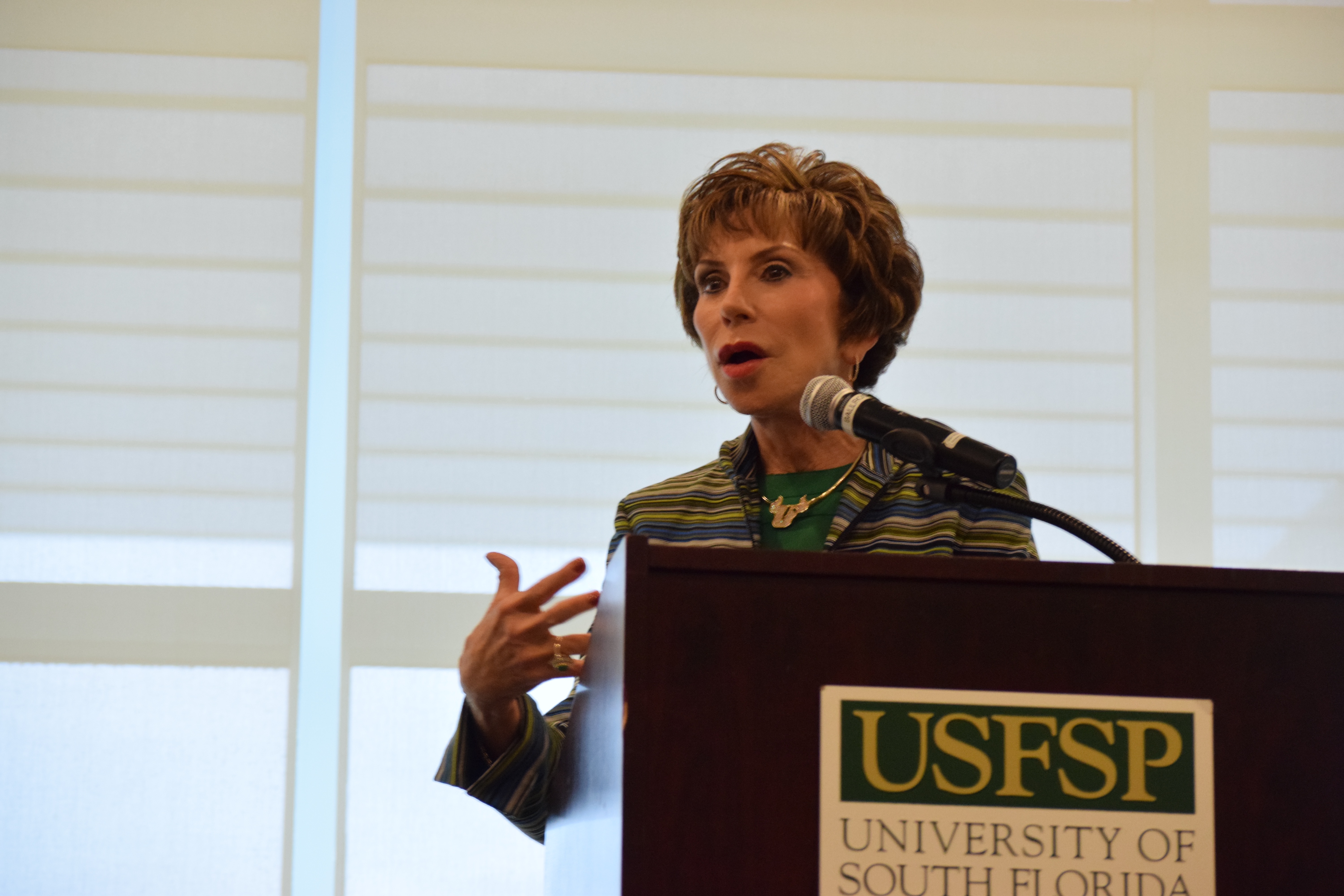Above photo: Judy Genshaft, President of the University of South Florida, is part of the exploitative academic industry. Jonah Hinebaugh | The Crow’s Nest
By Jonah Hinebaugh
According to the National Center for Education Statistics, the cost of attending a public institution has more than doubled between 2000 and 2015 and shows no signs of dropping.
With these rising costs, we need to evaluate the repercussions and reinforcement of obstacles posed against the working class as a whole.
An obvious and unfortunate reality is this rising cost makes attending any institution for higher education only accessible to the bourgeois who are able to afford it. There is no longer equal opportunity for anyone; people who aren’t lucky enough to be born in upper class families must fight an uphill battle throughout their life, with education being an obvious obstacle.
The exclusion of students from lower income backgrounds will lead only to further exploitation, and those who lack higher understanding of the schema of exploitation will have no way of fighting it.
How can you fight when the inner workings of the skewed economy are unknown to the uninitiated?
You can’t.
Too often lower class people support those who don’t act in their best interest because they were unable to gain the class consciousness that is so vital to ending the current regime that relies on a divided working class that feuds among themselves.
People are misled to believe that total individual freedom is a valuable pursuit.
The notion of valuing yourself above those around you is the leading factor in acting against the interests of the rest of your class. It is what so many succumb to when they are spoon fed their beliefs by the very people that intend to use them.
When someone from a working class background does attend an institution, chances are they’ll be so overwhelmed with debt after finishing that they’ll be forced into the same poverty cycle. They’ll be forced to work 50 plus hours a week, or multiple jobs, because of an unlivable minimum wage.
In some cases, people will be in debt their whole lives because of this.
While students work hard trying to keep their head above the water, there are corporate figureheads who benefit and capitalize off your money. In the USF system the most obvious exploitation is Judy Genshaft, who merely delegates any sort of labor to those below her.
Genshaft makes $900,000 a year but can’t find it in the budget to provide sick pay compensation for staff.
How could this be plausible when professors, who dedicate countless hours to providing the best and most valuable experience for their students, make bread crumbs by comparison.
Even worse is the attitude toward adjuncts who are forced to work at multiple schools and teach multiple classes just to pay rent and survive in this current cesspool.
The same adjuncts whom USF exploits to make up their undergrad courses without having to pay for a full-time professor, because the university cares more about their bottom line than their employees.
The same adjuncts who are fighting under the name Faculty Forward for a right to unionize and get a livable wage, one that doesn’t require teaching multiple courses at multiple schools: the movement that Genshaft opposes time and time again because that threatens her comfortable paycheck.
This student-turned-consumer model not only leads to further exploitation by the fabric that makes up universities, but also demonstrates the crude and revolting nature of capitalism.
Moving forward, we should follow the relentless effort by adjuncts to work toward equity for everyone, to truly present an opportunity for all to succeed. There’s no sight of that in the future, but there are ways to begin this battle.
Organizations like the Democratic Socialists of America, especially the youth DSA that are popping up on campuses all over the country including USF, are dedicated to the plights of underrepresented groups.
They give a voice to the voiceless and with your help can be a true movement to be reckoned with as well as a beacon of hope.
I urge everyone to fight for the interests of your peers and give them opportunities they may not be privileged enough to have.




I find the beginning of this “article” totally and purposely misrepresents the reality of higher education, and it also takes away from the main point that education is expensive. If a student or their family has wealth, the cost of education is paid by that family. However, if a student gets accepted, the vast majority gets aide based upon their financial need. This represents the greatest “leveling of the playing field” of our contemporary society- on par with public K-12 education. Recent data suggests that about 90% of all financial assistance is need based, and that about 85% of all students get some financial aid. The author is so obviously class-ist, and this takes away from the premise that adjuncts are not paid a living wage.
Just because a student receives financial aid doesn’t mean it covers all their costs and still can result in debt leading to a poverty cycle. The beginning of my article, in my opinion, doesn’t take away from the point that it is expensive and is only worsening as it becomes more commodified rather than a right for everyone which is also a major point of the article. Also, this is an oped meaning my view and I present it how I view it so quotation marks really make no sense. I would love to see some citation on your stats presented. In reference to your “class-ist” comment I would refer you back to the fact it is an oped not a news article. You’re allowed to disagree and I welcome your opinion, so thank you. If you would like to expand on your opinion please send us a letter to the editor so we can publish it! Have a good one.